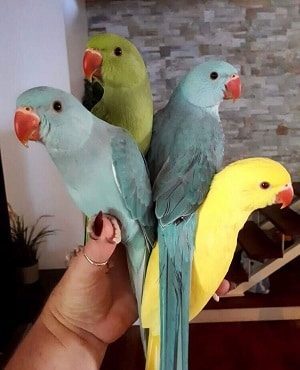Indian Ringneck Parrot Price
Last Updated on November 18, 2023
Written by CPA Alec Pow | Content Reviewed by ![]() CFA Alexander Popinker
CFA Alexander Popinker
The Indian ringneck parrot, commonly known as the Rose-ringed parakeet, is a captivating tropical bird known for its diversity in size and color. These parrots, sought after as family pets, can grow up to a notable 16 inches, with their elongated tail comprising a significant portion of their length.
Originating from the lush landscapes of Asia and Africa, Indian ringnecks are renowned for their engaging personalities, their flair for performing tricks, and their ability to participate in various games, making them delightful companions.
How much does an Indian ringneck parrot cost?
The price of an Indian ringneck parrot can span between as low as $250 and upwards of $1,200 for more uncommon varieties or unique color mutations, depending on a variety of factors including the bird’s age, gender, the breeder’s reputation, the specific species and its color variations, overall health, and the geographical location of the purchase.
However, market trends suggest that a standard blue or green Indian ringneck is typically priced between $200 and $350. According to experts, female parakeets often cost about 20 to 30 percent less than males of the same species.
In discussions on online forums, members have reported encountering ringnecks with prices as varied as $50 to a steep $1,000. On BirdsNow, a well-known online bird classified platform, around 120 listings showcased a wide array of prices. These ranged from a modest $150 for an older, nine-year-old bird to a vibrant, younger yellow bird priced at around $800.
One-Time Costs and Adoption Options
When considering adopting an Indian ringneck parrot, it’s important to understand the one-time costs involved. These costs vary significantly depending on whether you adopt from a rescue or buy from a breeder. Adoption fees generally range from $100 to $1,000, with potential discounts if multiple birds are adopted.
While finding a free Indian ringneck is unlikely due to its popularity, adopting from a rescue can be more affordable than purchasing from a breeder, where prices can escalate from $400 to a staggering $1,500. The cost often reflects the parrot’s type and color, with certain hues like blue commanding prices upwards of $2,000.
Initial Setup and Supplies
Setting up a home for your new Indian ringneck parrot involves some initial investment, ranging from $250 to $350. This includes purchasing a suitable cage, which should be spacious and durable, costing between $100 and $300.
You’ll need various perches, toys, and accessories, costing about $30 to $100, to keep your parrot engaged and healthy. Essential items also include stainless steel or ceramic food and water bowls, priced between $10 and $30. If adopting from a shelter, some of these supplies might be included, but buying from a breeder will likely incur these additional costs.
Monthly Costs when buying an Indian ringneck Parakeet
 Once your Indian ringneck parrot is comfortably settled in, the ongoing monthly expenses can range from $50 to $150. This includes up to $50 for healthcare, given their susceptibility to common pet diseases. Regular vet visits are crucial for their well-being.
Once your Indian ringneck parrot is comfortably settled in, the ongoing monthly expenses can range from $50 to $150. This includes up to $50 for healthcare, given their susceptibility to common pet diseases. Regular vet visits are crucial for their well-being.
The monthly food budget is around $10 to $30, with fresh fruits and vegetables supplementing their diet. Unexpected medical costs or emergency treatments can also arise, so setting aside funds for such events is wise. Entertainment and enrichment, including toys and activities, may add an additional $5 to $20 to your monthly budget.
Common Illnesses and Health Concerns
Indian ringneck parrots, like other pets, are prone to certain illnesses. Key health concerns include Coccidiosis, a deadly parasitic gastrointestinal disease, various parasites like worms and mites, and even depression, a serious issue given their high intelligence.
Regular veterinary checkups and a stimulating environment are crucial to prevent these conditions. Loneliness can be particularly stressful for these birds, so providing them with sufficient attention or a companion bird is recommended.
Dietary Needs and Feeding
A balanced diet is vital for the health of your Indian ringneck parrot. High-quality pellets should form the base of their diet, supplemented with seeds, fresh fruits, and vegetables.
Occasional treats of cooked grains, legumes, and lean meats can be offered, but it’s crucial to avoid toxic foods like avocado and chocolate. Regularly changing and cleaning their food and water bowls is also important for maintaining hygiene.
Cleaning Supplies and Habitat Maintenance
Regular cleaning of the cage, perches, and toys using bird-safe products is necessary to maintain a hygienic living environment. Suitable litter or bedding in the cage base helps absorb waste and simplify cleaning.
Providing a variety of toys and natural elements like branches or logs will keep your parrot mentally stimulated and physically active, helping to prevent boredom and behavioral issues.
Grooming and Veterinary Care
Proper grooming, including regular nail trims and beak maintenance, is essential. Consult with a veterinarian or professional groomer for guidance on safely performing these tasks.
Regular veterinary checkups are crucial for early detection of health issues, with annual visits recommended for preventive care. Be prepared for potential emergency medical treatments and the associated costs.
Regular tests and diagnostics, as well as medications or supplements, may also be necessary to ensure your parrot’s health and longevity.
Based on recent listings for Indian ringneck parrots, here is a list of prices you will likely stumble upon:
Indian Ringneck Parrot Prices on different websites
BirdsNow.com: A wide selection of ringneck parakeets, including various colors and ages, was available for sale from breeders and bird rescues across the US. Specific listings included:
- A young, female Violet turquoise Indian ringneck parakeet in Austin, TX, priced at $1,600
- Two sweet, DNA-tested male and female Blue Indian Ringneck babies, also in Austin, TX, ready for their forever homes at $1,250 each
- Lutino Indian Ringneck babies, both male and female, weaned on a healthy diet, available for $1,250
- Violet Ringneck hens, handfed and DNA sexed, priced at $700 in Oklahoma City, OK
- Young ringneck parakeets in San Jose, CA, handfed but a bit nippy, selling for $600
BirdBreeders.com: The site listed 33 Ringneck Indian Parakeets from various breeders across the US. These birds were hand-raised, DNA-tested, and weaned, with photos and prices available for each listing
Petzlover.com: This platform had listings for Indian Ringneck parrots in various states, including:
- A $700 Ringneck in Dunnville, Kentucky.
- Ringneck parrots in need of a good home, priced at $3,000 in Parkville, Maryland.
- A male Indian Ringneck parrot for $475 in Poinciana, Florida.
- An adult female lutino Indian ringneck for $300 in Tucson, Arizona
Birdman’s Petsource: They offered a wide collection of Indian Ringnecks for sale, emphasizing the long history of the Indian Ringneck parrot as a pet and its popularity as a bird companion
What Does the Adoption Fee Include?
When you adopt an Indian ringneck parrot, reputable breeders typically provide extensive care to the young birds. They hand-feed them until they are ready for adoption, ensuring a smooth transition when you take them home by gradually weaning them off.
A legitimate health certificate from a certified veterinarian, backed by a health warranty, is usually part of the package. While gender confirmation through DNA testing may be offered by some breeders, it’s not always a necessity since the bird’s gender is often distinguishable by its color patterns.
Also read our articles about the cost of a toucan, cockatiel, or peacock.
Deposit and Final Adoption Fees
Before you can take your new feathered friend home, breeders usually require a deposit. This amount typically ranges from $100 to $200 or could be a specified percentage of the total sale price. This deposit is later credited towards the final adoption fee.
Additional Costs to Consider
 For those seeking rarer bird types, it’s often necessary to look beyond local sources. If personal pickup isn’t feasible, shipping costs can start at $150, varying based on the distance and the logistics involved in transportation.
For those seeking rarer bird types, it’s often necessary to look beyond local sources. If personal pickup isn’t feasible, shipping costs can start at $150, varying based on the distance and the logistics involved in transportation.
The minimum recommended cage size is 22 by 24 inches. To keep your bird mentally stimulated and entertained, especially when left alone, it’s crucial to furnish the cage with toys such as swings and objects that are safe for chewing. Lack of stimulation can lead to the bird chewing on the cage bars or exhibiting destructive behavior.
Behavioral and Physical Traits
Male Indian ringneck parrots are distinguished by a colored ring around their neck, a feature absent in females and younger birds. Some females may display a faint, grayish ring.
Notably, these parrots have large tails consisting of 12 feathers, with two dominant blue feathers contributing significantly to the bird’s overall length, sometimes extending up to 8 inches. Their predominantly green plumage can make them quite elusive to spot within their cage or nest environments.
These parrots are available in various hues, including yellow, green, blue, albino, or combinations thereof.
Indian ringnecks are social birds, known for their showmanship, adeptness at games, and impressive capacity to learn and speak more than 15 words. Properly cared for, they can live up to 40 years, making them long-term companions.
Tips for First-time Bird Owners
Indian ringneck parrots are often recommended for first-time bird owners due to their outgoing nature and social disposition. These birds are not excessively loud as long as you properly tame them, making them suitable for living in condos or small apartments.
Saving on Costs
One way to potentially save on costs is to adopt a bird locally, thereby eliminating shipping expenses and allowing for a personal inspection of the bird. Platforms like Craigslist sometimes have listings where owners are giving away older birds along with their supplies, which can be a great way of saving, as you won’t have to buy all of the things needed to accommodate a bird in your home.


Leave a Reply
Want to join the discussion?Feel free to contribute!